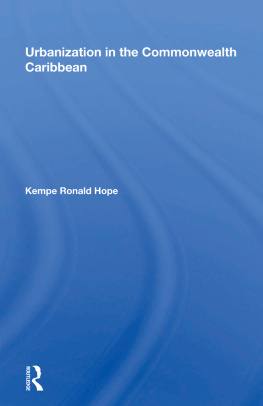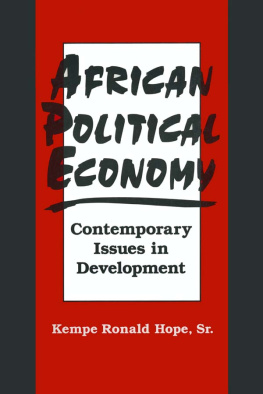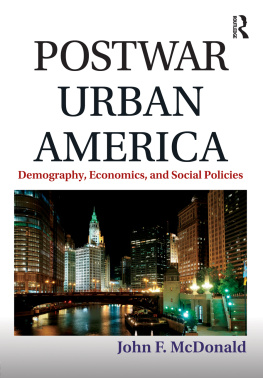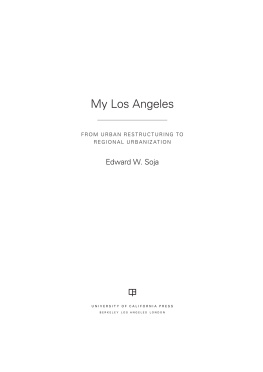URBANIZATION IN THE COMMONWEALTH CARIBBEAN
Westview Special Studies
The concept of Westview Special Studies is a response to the continuing crisis in academic and informational publishing. Library budgets are being diverted from the purchase of books and used for data banks, computers, micromedia. and other methods of information retrieval. Interlibrary loan structures further reduce the edition sizes required to satisfy the needs of the scholarly community. Economic pressures on university presses and the few private scholarly publishing companies have greatly limited the capacity of the industry to properly serve the academic and research communities. As a result, many manuscripts dealing with important subjects, often representing the highest level of scholarship, are no longer economically viable publishing projectsor, if accepted for publication, are typically subject to lead times ranging from one to three years.
Westview Special Studies are our practical solution to the problem. As always, the selection criteria include the importance of the subject, the work's contribution to scholarship, and its insight, originality of thought, and excellence of exposition. We accept manuscripts in camera-ready form, typed, set, or word processed according to specifications laid out in our comprehensive manual, which contains straightforward instructions and sample pages. The responsibility for editing and proofreading lies with the author or sponsoring institution, but our editorial staff is always available to answer questions and provide guidance.
The result is a book printed on acid-free paper and bound in sturdy library-quality soft covers. We manufacture these books ourselves using equipment that does not require a lengthy make-ready process and that allows us to publish first editions of 500 to 1,500 copies and to reprint even smaller quantities as needed. Thus, we can produce Special Studies quickly and can keep even very specialized books in print as long as there is a demand for them.
About the Book and Author
Focusing on Barbados, Trinidad and Tobago, Jamaica, and Guyana, Professor Hope examines the determinants and socioeconomic consequences associated with urban population growth. He documents demographic trends in the region, examines government policies that inadvertently encourage urbanization, and discusses the effects of too-rapid growth on urban services and the employment rate. He concludes with policy suggestions for managing growth, counteracting the urban bias, and stemming rural-to-urban migration. Throughout the book, the author uses a multidisciplinary approach that draws on economics, sociology, demography, urban planning, and public administration.
Dr. Kempe Ronald Hope is Fulbright Professor of Economics and Public Policy in the Faculty of Social Sciences and is Visiting Associate Research Fellow in the Institute of Social and Economic Research at the University of the West Indies, Mona Campus, Jamaica. Dr. Hope's previous books include Guyana: Politics and Development in an Emergent Socialist State (1985); The Dynamics of Development and Development Administration (1984); and Recent Performance and Trends in the Caribbean Economy (1980).
TO
DESSETA, DAWN, EUCLYN, AND KEMPE, Jr.
Urbanization in the Commonwealth Caribbean
Kempe Ronald Hope
First published 1986 by Westview Press
Published 2018 by Routledge
52 Vanderbilt Avenue, New York, NY 10017
2 Park Square, Milton Park, Abingdon, Oxon OX14 4RN
Routledge is an imprint of the Taylor & Francis Group, an informa business
Copyright 1986 by Taylor & Francis
All rights reserved. No part of this book may be reprinted or reproduced or utilised in any form or by any electronic, mechanical, or other means, now known or hereafter invented, including photocopying and recording, or in any information storage or retrieval system, without permission in writing from the publishers.
Notice:
Product or corporate names may be trademarks or registered trademarks, and are used only for identification and explanation without intent to infringe.
Library of Congress Cataloging-in-Publication Data
Hope, Kempe R.
Urbanization in the Commonwealth Caribbean.
(Westview special studies on Latin America and
the Caribbean)
Bibliography: p.
Includes index.
1. Cities and townsCaribbean AreaGrowth.
2. Economic developmentCaribbean Area. 3. Rural-urban
migrationCaribbean Area. 4. Urban policyCaribbean
Area. I. Title. II. Series.
HT128.5.A2H66 1986 307.7'6'09729 86-1674
ISBN 13: 978-0-367-21293-3 (hbk)
The urbanization of the Third World as a result of rapid growth in the urban population has now become a matter of great concern and study by the governments of the Third World nations as well as the international development agencies. Currently, about 75 percent of the world's population live in the Third World and it is projected that by the year 2000 the majority of the world's urban population (66 percent) will reside in the Third World. As the population explosion continues, political and economic pressures will rise enormously in many of those nations. The expulsion of hundreds of thousands of aliens from Nigeria in 1983 and again in 1985 is but one illustration of this point.
Interest in the study of urbanization in the Commonwealth Caribbean has not been intense and, as such, not much in the way of research studies has been produced on the topic vis--vis the various countries of the region. But urban population growth and its consequences in the Commonwealth Caribbean are critical issues for the future of the region and need more interdisciplinary concern and research endeavours from social scientists, planners, and policy-makers. This book makes one contemporary attempt to synthesize, in a comparative manner, the significance of the trends, consequences, and policy implications of rapid urban population growth and urbanization using, as a case study, Barbados, Guyana, Jamaica, and Trinidad and Tobago - The More Developed Commonwealth Caribbean Countries (MDCC's).
The above four countries chosen for this study are representative of the Commonwealth Caribbean region in terms of social, cultural, and economic structure and they cover a wide geographical area spanning from Guyana in South America through Trinidad and Tobago and Barbados in the Eastern sector (Lesser Antilles) to Jamaica in the Northern sector (Greater Antilles). The Commonwealth Caribbean nations share a history of slavery and British colonialism, some common economic problems as well as some similar socio-economic characteristics. All of the countries lie within the tropics; English is their official language; they are all members of the Caribbean Community (CARICOM); they are all heavily dependent on trade with the United States; and they all suffer from high urban population densities and significant international and internal migration.
This book is divided into five chapters. The first chapter provides an analytical overview of urbanization and economic development in the Third World exploring the various issues with regard to the trends, components, consequences, and management policies. The second chapter begins the Caribbean case study by examining the structure, sources, and the impact of urban population growth and urbanization in the Caribbean. Chapter three provides a discussion of unemployment and labour force participation within the context of urbanization in the Caribbean. Chapter four considers and advocates a set of policies for managing rapid urban population growth and urbanization in the Caribbean, and the final chapter gives a summary and concluding statements on the work.









